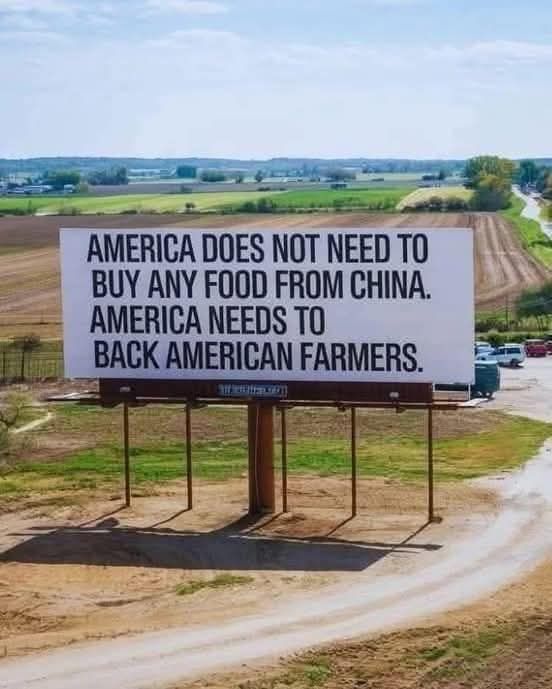🇺🇸 Why Supporting American Farmers Matters More Than Ever
“America does not need to buy any food from China. America needs to back American farmers.”
This bold statement, seen on a billboard set against the backdrop of American farmland, captures a growing sentiment across the country: the need to re-emphasize food independence and local agriculture. While global trade is essential for economic diversity and cultural exchange, there is increasing concern over the heavy reliance on foreign food imports—particularly from countries like China.
🌾 The Case for Buying American-Grown Food
American farmers are the backbone of the nation’s food system. They supply everything from fresh produce and grains to dairy and meat, supporting not only our nutritional needs but also rural economies. When you buy American-grown food, you’re:
-
Supporting Local Jobs
Farming employs millions of Americans directly and indirectly through transportation, food processing, and distribution networks. -
Enhancing Food Security
Depending less on foreign imports reduces vulnerability to international disruptions—whether due to political tensions, trade wars, or global pandemics. -
Ensuring Quality and Safety Standards
U.S. agriculture is held to rigorous safety, environmental, and ethical standards that are not always matched by other countries.
🌍 Why Do We Import Food from Countries Like China?
Despite America’s rich agricultural resources, the U.S. still imports food for a variety of reasons:
-
Cost: Imported products are often cheaper due to lower labor and production costs abroad.
-
Variety: Items like exotic fruits, spices, and certain seafood simply aren’t produced in large quantities domestically.
-
Consumer Demand: Many Americans enjoy international cuisines that require specialty ingredients.
China, in particular, exports large amounts of seafood, garlic, mushrooms, frozen meals, and snack foods to the U.S. These products often appear in Asian grocery stores, which serve both immigrant communities and adventurous food lovers alike.
⚠️ Concerns Over Imported Food Safety
There have been legitimate concerns about food safety in imports from China. Cases of food contamination, melamine-laced milk powder, and mislabeled ingredients have raised alarm. While these incidents are rare, they have left lasting impressions.
Still, it’s important to note:
-
The U.S. Food and Drug Administration (FDA) inspects imported foods and blocks products that don’t meet American standards.
-
Most imported foods are safe, and many Chinese brands have invested heavily in international food safety compliance.
✅ Striking a Balance: Global Curiosity & Local Loyalty
Rather than shunning all foreign food, the goal should be informed choice. It’s okay to enjoy imported soy sauce or green tea — but it’s also vital to ask:
Am I also supporting local producers?
Some ways to do both:
-
Shop at farmers markets and co-ops.
-
Choose U.S.-grown produce and meat when possible.
-
Support food brands that are transparent about their sourcing.
-
Encourage local schools and institutions to source food from nearby farms.
❤️ Conclusion: A Vote with Your Fork
The billboard is more than a slogan — it’s a call to action. Buying American-grown food helps strengthen our communities, preserve farmland, and safeguard the future of the nation’s food supply.
You don’t have to boycott imported goods. But every time you choose an American apple over a cheaper imported one, you’re not just making a nutritional decision — you’re casting a vote for local resilience.
Is it safe to eat food imported from China to the US?
There’s a pan-Asian grocery store that opened fairly close to my home (in Ohio) recently. It has food from all over Asia, but seems to have a heavy focus on Chinese food (much of it imported from China.)
On one hand, I’m curious about trying it (and have no reservations about the obviously fresh food.) On the other hand, I’ve also heard a lot of horror stories about Chinese companies putting things that should not be in food in their food. (I don’t think the store would stock questionable food deliberately, but they might unknowingly.) I’m not sure how much truth there is to these stories– I don’t doubt they happened, but as far as I know it could be xenophobes making mountains out of molehills.
